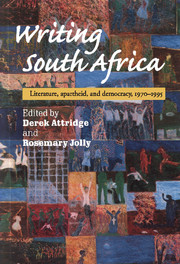Book contents
- Frontmatter
- Contents
- Contributors
- Acknowledgements and note on references
- South Africa, 1930–1996: a chronology
- Maps
- 1 Introduction
- 2 Interrogating silence: new possibilities faced by South African literature
- 3 I am dead: you cannot read: André Brink's On the Contrary
- 4 Endings and new beginning: South African fiction in transition
- 5 The post-apartheid sublime: rediscovering the extraordinary
- 6 Postmodernism and black writing in South Africa
- 7 Shame and identity: the case of the coloured in South Africa
- 8 A man's world: South African gay writing and the State of Emergency
- 9 The final safari: on nature, myth, and the literature of the Emergency
- 10 Interview
- 11 Speech and silence in the fictions of J.M.Coetzee
- 12 ‘Dialogue’ and ‘fulfilment’ in J.M. Coetzee's Age of Iron
- 13 Interview
- 14 Inside out: Jeremy Cronin's lyrical politics
- 15 Spinning out the present: narrative, gender, and the politics of South African theatre
- 16 South African theatre in the United States: the allure of the familiar and of the exotic
- Position papers
- Select bibliography: South African literary writing in English, 1970–1995
- Index
11 - Speech and silence in the fictions of J.M.Coetzee
Published online by Cambridge University Press: 05 July 2011
- Frontmatter
- Contents
- Contributors
- Acknowledgements and note on references
- South Africa, 1930–1996: a chronology
- Maps
- 1 Introduction
- 2 Interrogating silence: new possibilities faced by South African literature
- 3 I am dead: you cannot read: André Brink's On the Contrary
- 4 Endings and new beginning: South African fiction in transition
- 5 The post-apartheid sublime: rediscovering the extraordinary
- 6 Postmodernism and black writing in South Africa
- 7 Shame and identity: the case of the coloured in South Africa
- 8 A man's world: South African gay writing and the State of Emergency
- 9 The final safari: on nature, myth, and the literature of the Emergency
- 10 Interview
- 11 Speech and silence in the fictions of J.M.Coetzee
- 12 ‘Dialogue’ and ‘fulfilment’ in J.M. Coetzee's Age of Iron
- 13 Interview
- 14 Inside out: Jeremy Cronin's lyrical politics
- 15 Spinning out the present: narrative, gender, and the politics of South African theatre
- 16 South African theatre in the United States: the allure of the familiar and of the exotic
- Position papers
- Select bibliography: South African literary writing in English, 1970–1995
- Index
Summary
David Attwell maintains that Coetzee's novels are ‘directed at understanding the conditions – linguistic, formal, historical and political – governing the writing of fiction in contemporary South Africa’. In turn, he offers the volume of interviews and essays he has edited as reflecting ‘on an encounter in which the legacies of European modernism and modern linguistics enter the turbulent waters of colonialism and apartheid’ (Coetzee, Doubling the Point, 3). This is an apt and elegant designation of the fictions' moment and space, and I use it as a starting point for considering the ways this fraught confluence is negotiated in self-reflexive novels which stage the impossibility of representation, estrange the norms of reality, and work, in Coetzee's words, to ‘demythologize history’.
Metropolitan reviewers, as well as those critics whose attention, when reading South African novels, was focused on detecting condemnations of an egregious political system, have been predisposed to proffer Coetzee's fictions as realist representations of, and humanist protests against, colonial rapacity at large, and in particular against the intricately institutionalized system of racial oppression that until recently prevailed in South Africa. Other critics whose concern is with the radicalism of Coetzee's textual practice, and who foreground parody and reflexivity as oppositional linguistic acts, argue that the authority of colonialism's narratives is undermined by subversive rewritings of the genres traditional to South African fiction–the heroic frontier myth, the farm romance, the liberal novel of stricken conscience – hence opening conventions to scrutiny and confronting the traditional and unquestioned notion of the canon (see Attridge, ‘Oppressive Silence’).
- Type
- Chapter
- Information
- Writing South AfricaLiterature, Apartheid, and Democracy, 1970–1995, pp. 149 - 165Publisher: Cambridge University PressPrint publication year: 1998
- 13
- Cited by



